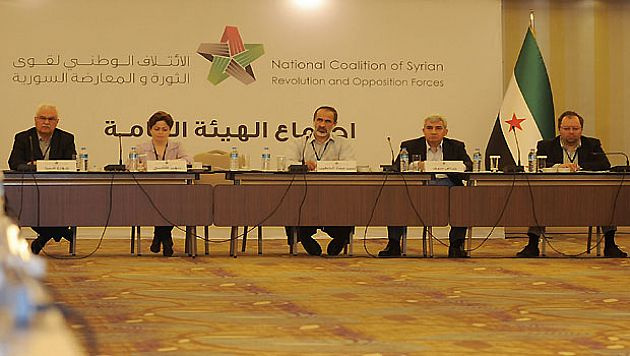Saudi Arabia Defeated by Turkey in Syrian Crisis

The results of the internal elections of the 18th meeting of the Syrian National Coalition indicate that Khaled Khoja has defeated his rival, Nasser al-Hariri, with 56 votes and a 6 vote difference and was elected as the new president of this coalition.
Dr. Khaled Khoja was previously the speaker and representative of the Syrian opposition in Turkey and is originally from the Turkmens of Syria. He finished his middle school studies in Syria and in the Arabic language. He was imprisoned when he was 15 years old due to his father’s activities in Syria’s Muslim Brotherhood. Following the events in Hama, his family left Syria and he was freed from prison when he was 17 years old. He went to Turkey in 1982 and continued his studies there. He received his Master’s degree in Political Science in Istanbul and later got his medical degree. He has since lived in Istanbul and is fluent in Arabic, English and Turkish.
I interviewed him twice in 2012 and am familiar with his views and approaches. One of his most significant characteristics is his realistic view of the Syrian opposition’s status and criticisms against the actions taken by the political and military institutions of the opposition. He stated in those two interviews that the opposition has no special status, neither in Bashar Assad’s government nor in the Syrian society and problems exist in drawing the political plans of the opposition. The following points could be mentioned regarding the election of Khaled Khoja as the president of the Syrian opposition:
The election of a Turkmen who has studied and long lived in Turkey shows that the attempts made by Saudi Arabia to lead the opposition have failed and the winners are Turkey and Qatar and the Turkish-Muslim Brotherhood line has more power to maneuver.
Khaled Khoja has defeated his rival with only six votes and that is an indication that there are different poles in the structure of the opposition and reaching relative unity may seem difficult. It should be pointed out that the previous presidents had won the elections in a similar manner and the internal equations of the coalition have gone through changes which, based on the statements made by the members of this coalition, are deeply related to the involvement of other countries.
The coalition of Syrian opposition has elected Khaled Khoja at a time when the joint project of Iran and Russia is proposed in order to establish communication and a bridge and negotiation between Bashar Assad’s regime and the opposition. It is said that in the meeting between Mikhail Bogdanov and Muaz al-Khatib, the former president of the coalition, certain promises were made and based on unconfirmed reports it may seem possible that in an agreement the position of the prime minister would be given to al-Khatib and Bashar Assad would only control the military and security forces of Syria.
Khaled Khoja’s presidency is simultaneous with the US and Turkey’s bargaining regarding the important issue of training and arming and equipping opposition forces inside Turkey. Although some Turkish media have stated that the trainings have already started and the required equipment has reached Turkey, the continuation of differences between Ankara and Washington, the non-joining of Turkey to the anti-ISIS coalition and Davutoglu’s insistence on the establishment of a wall and a no-fly zone show that the logistic objective of training and arming the opposition is still under a vague shadow.
The young Khaled Khoja is faced with numerous challenges one of which is to define the mechanism of collaboration with the Free Syrian Army. Some of the commanders of the Free Army believe that their views are necessary in making big strategic decisions and they are not ready to support all decisions which are made by the political opposition. This is while some other commanders believe that in the area of political negotiation and decision-making for peace or war, politicians should be the initiators. Meanwhile, there are reports of the influence of the Syrian Baathists in the coalition of the opposition which has caused mistrust among its members.
One of the other problems which Khaled Khoja is faced with is the continuation of ISIS’ presence in Syria. Under conditions when the US and Iraq prepare themselves to defeat ISIS in the operation of liberating Mosul, this terrorist force has no choice but to return to Syria, thus, their military and defensive power in ar-Raqqah will be so strengthened that the Syrian opposition, the Assad regime and the opposition coalition and even the Moscow Conference will be impacted by such developments.
The National Council of Syrian Kurds (ENKS), which is the biggest joint institution of the Syrian Kurds which are close to Masood Barzani, the head of Iraq’s Kurdistan Province, has sent a letter to the opposition coalition and asked the president of this coalition to dismiss the two Kurdish representatives in the present coalition in Istanbul with the accusation of having secret cooperation with the political movements which are close to the PKK. This letter is sent while the Peshmerga forces under the command of Barzani have left Turkey for Kobani and are fighting alongside the armed forces of the Democratic Unity Party (which is affiliated to the PKK) against ISIS. At the same time, the forces of the Democratic Unity Party which are called the Syrian branch of the PKK, are seriously collaborating with the US in their fight against ISIS. This issue could lead to the elimination of the PKK from the international terrorist list. Meanwhile, Saleh Muslim, the leader of the Democratic Unity Party, has met with Bogdanov in his trip to Moscow and has stated his readiness to participate in the Moscow Conference. This issue shows that contrary to the previous assumptions, the issue of the Syrian Kurds and their different cards could create new challenges for the opposition coalition and its new Turkmen president.

